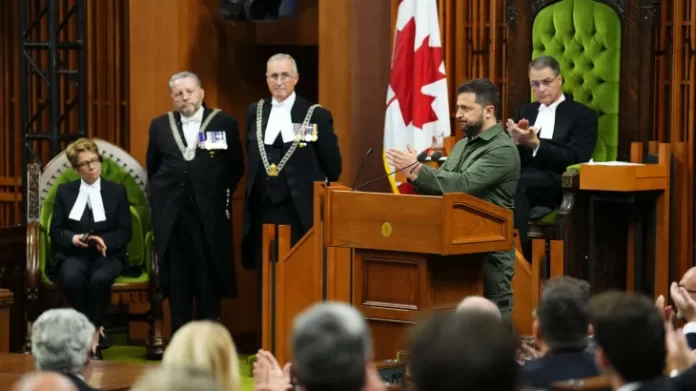House Speaker Anthony Rota praised 98-year-old Yaroslav Hunka, calling him a “Ukrainian hero” at the Canadian Parliament, attended by Volodymyr Zelensky and Justin Trudeau.
Rota recognised Hunka as “a Ukrainian hero, a Canadian hero,” thanking him “for all his service” in front of the Canadian Parliament on Friday.
Yaroslav Hunka fought in World War II as a member of the 14th SS Waffen Grenadier Division, according to the Jewish human rights group Simon Wiesenthal Friends Centre, which demanded an apology.
The centre claimed Hunka’s links to the war machine of Adolf Hitler’s regime were “well-documented.” On Sunday, Rota took responsibility for what he called an oversight, describing the initiative as “entirely my own.” He also offered his “deepest apologies to Jewish communities in Canada and around the world.”
I have subsequently become aware of more information which causes me to regret my decision.
The recognition came amid the visit by Zelensky who thanked Canada for its help in Ukraine’s war against Russia. Rota stated that no one, including fellow parliamentarians or the Ukrainian delegation, had prior knowledge of the Ukrainian President’s plans or remarks.
Following Zelensky’s remarks, Rota thanked Hunka, who was seated in the gallery, and praised him for fighting for Ukraine’s independence against the Russians. To the applause of Canadian lawmakers, Zelensky raised his fist in appreciation and Hunka saluted.
The statement of the Friends of Simon Wiesenthal Centre contains the following lines:
“At a time of rising anti-Semitism and Holocaust distortion, it is incredibly disturbing to see Canada’s parliament rise to applaud an individual who was a member of a unit in the Waffen-SS – a military branch responsible for the murder of Jews and others.”
An explanation must be provided as to how this individual entered the hallowed halls of Canadian parliament and received recognition from the Speaker of the House and a standing ovation.
Russian state media said the embassy would send a letter to Trudeau and a note to Canada’s foreign ministry on Monday.
“We will, of course, demand clarification from the Canadian government.”
Dominique Arel, chair of Ukrainian Studies at the University of Ottawa, called the incident “a highly problematic.”
We have the issue of symbolism here, the optics of serving in a military unit whose logo is that of arguably the greatest criminal organisation in the 20th century … so obviously the optics are not good.
B’nai Brith Canada’s CEO, Michael Mostyn, was displeased that parliament honoured the memory of an SS unit’s former member. He also claimed that Ukrainian “ultra-nationalist ideologists” who volunteered for the Galicia Division “dreamed of an ethnically homogeneous Ukrainian state and endorsed the idea of ethnic cleansing.”
“We understand an apology is forthcoming. We expect a meaningful apology. Parliament owes an apology to all Canadians for this outrage, and a detailed explanation as to how this could possibly have taken place at the centre of Canadian democracy.”
